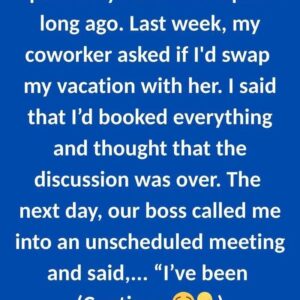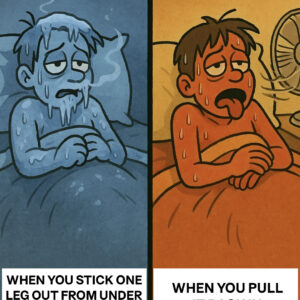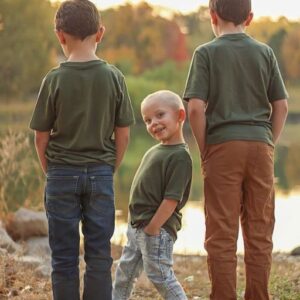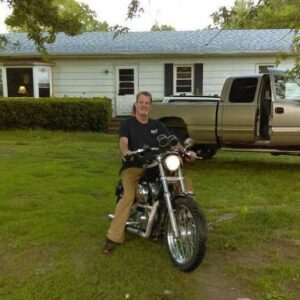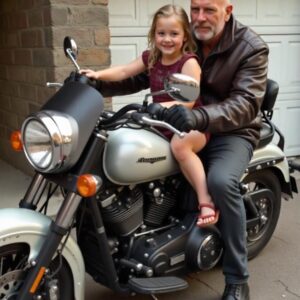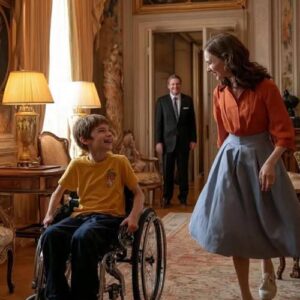
People always said there was no way a child could feel safe with a man who looked like me. I heard the whispers every time I walked into a grocery store or parked my bike outside a diner. A long chain of ink winds up my neck and under my jaw, telling the story of every unit I served with in the Marines. My knuckles carry little ridges and pale scars from more bad nights than I like to admit. Old leather hangs off my shoulders—a sleeveless “cut” with the Steel Angels patch sewed big on the back. To most strangers those patches might as well spell DANGER in bright red letters.
I learned early that people judge first and talk second. I could live with that—until the day the system told me that their snap judgment mattered more than the promise I made to my sister.
Losing Elaine
Growing up, Elaine was the light in every room. I was two years older and a life-long trouble magnet, but she never quit on me. When I signed up for the Marines after high school, she hugged me so hard my ribs hurt, then handed over a tiny silver compass. “So you always find your way home,” she said. I wore that compass for two tours overseas, then kept it on my dresser when I came home, because by then home had shifted. Elaine had married, bought a small house in the suburbs, and had a son—Tommy. I stayed near the city, fixed cars, joined the Steel Angels, and rolled through weekends full of noise, music, and long roads.
Life felt full and wild until Elaine’s call shook me awake. Cancer. Fast. Doctors said months; the disease stole her in ten weeks. During those final days I slept on a vinyl chair next to her hospital bed and read comics to Tommy while machines beeped out the ticking clock none of us could stop.
One quiet night, thin moonlight spilling into the room, Elaine cleared her throat, reached for my wrist, and spoke through pain. “Frankie, promise me something.”
“Anything.”
“Promise you’ll take Tommy if I don’t—if I can’t—” She couldn’t finish.
I grabbed her hand. “He’s my nephew. I will love him like he’s my own.”
She smiled, weak but sure. “You’re rough on the outside, but all heart on the inside. People just need time to see it.” She closed her eyes, still holding my hand, and I felt the promise sink deep in my bones.
She died five days later.
Meeting the System
A family court judge wasted no time appointing a temporary foster family “for the child’s immediate stability.” They had rules to follow, forms to stamp, boxes to tick. I understood that. What I didn’t understand was the wall I slammed into when I tried to bring Tommy home.
That wall had a name: Judith Harmon. She met me in a tiny office stuffed with old binders and a faint smell of copier ink.
She skimmed my file: Marine history, honorable discharge, job as a mechanic, home address, club membership. Then her eyes traveled to my throat tattoos. Her lips pinched.
“Mr. Davidson, we need to be sure any placement is in a child’s best interests,” she said, voice tight like a door that squeaks but never opens wide.
“I am his uncle,” I answered, keeping my tone steady. “My sister named me guardian in her will.”
“Wills are considered,” she replied, “but our top priority is a safe, stable environment.”
“I own a modest house, no debt, steady job. That’s pretty stable.”
She tapped her pen. “Children from traumatic backgrounds may feel threatened by certain appearances and lifestyles.”
“By my appearance?”
“Your tattoos, your… motor-cycling affiliations.” She pronounced each syllable like a bad taste.
“We’re a club of veterans. We raise money for kids’ cancer wards.”
Her brow twitched. “Some motorcycle clubs have criminal reputations.”
“Some bankers steal pensions,” I returned. “Doesn’t mean every guy in a tie is dirty.”
Her nostrils flared, but she kept her voice level. “We’re scheduling a full review. Until then, Tommy will remain in foster care. You may request supervised visits.”
She slid a photo across the desk: Tommy half-hidden behind a caseworker, staring wide-eyed at a volunteer biker who had brought toys that day. “That was his reaction to a man in leather,” she said. “Still believe he should live with you?”
I felt hurt burn up my throat, but I swallowed it. “More than ever,” I said. “I’m not walking away.”
Outside her office, I stood in the hallway so long a guard asked if I was lost. I wasn’t lost. I was furious—and determined.
Remodeling My World
The next morning I listed my Harley online. The bike had carried me across deserts and up into mountain curves, wind in my teeth, but I needed that down payment for a house near the elementary school. A week later I cleaned out my garage locker, boxed extra gear, and told Bear, our club president, I’d be missing some weekend rides. “Kid stuff,” I said. Bear slapped my back and said, “Family first, brother. We got you.”
I signed up for every parenting class the county offered: infant CPR, toddler nutrition, early childhood trauma. Some volunteers looked twice when I walked in—inked, broad-shouldered, sitting among pastel-sweater parents—but I nodded hello and listened harder than anyone. I stopped cursing in casual talk, practiced please and thank you until they slipped out easy, swapped late-night bar runs for evenings studying bedtime routines.
Meanwhile the Steel Angels hosted a charity wash for hospital bills. When strangers squinted at the rough crew buffing cars, we grinned back. I raised my hand during the event, mic shaking, and told the crowd: “Every dollar helps families like mine. My nephew just lost his mother. Some people think I look too scary to raise him. You tell me—do scars cancel love?”
A cheer answered. Money flowed into the bucket.
Visits with Tommy
Judith allowed one-hour weekly visits, always in the playroom of a drab building that smelled like plastic toys wiped with disinfectant. I entered each time in pressed jeans, hair shaved neat, shirt buttoned to my neck to hide part of my ink. Tommy would peek from behind a stack of blocks, then break into a run. I knelt so he could tackle-hug my chest.
We played with wooden trains or painted dinosaurs. I read stories about trucks that talk. Judith sat in a corner chair, jotting notes whenever Tommy reached for my arm. I forced myself not to look at her clipboard. Focus on the kid. He giggled, shoved toy cars along my tattoos, traced the lines like roads.
When the hour ended, a buzzer sounded. Tommy’s little face fell each time. He would cling to my sleeve. “Why can’t I come with you?” The first time he asked, I nearly broke. I inhaled. “Because there are rules, buddy, and the rules take time.” He sniffed. I scooped him up, pressed my nose to his hair, whispered, “I’m working on it. Promise.”
Judith cleared her throat. Time. Hand him over. I did—but each time my heart felt ripped out.
Paper Fights
Legal battles chew up money faster than a bike guzzles gas. My savings shrank; the club passed a helmet for donations. My boss at the garage wrote a letter: “Frank is our best employee, punctual, honest.” An elderly neighbor signed a statement: “He shovels my walk every storm.” The local food-bank director noted the day I repaired their delivery van for free.
Judith remained skeptical. She set more inspections: fire alarms, medicine locks, fence height. I installed everything. She requested financial proof. I showed bank slips. She wanted references from non-motorcycle friends. I dug up buddies from high-school baseball who said I once broke my hand punching a bully who stole a kid’s bike.
The judge reset the final court date twice. Each time my nerves frayed. Nights I couldn’t sleep, I polished Tommy’s new bunk-bed rails or practiced tying tiny sneakers.
The Runaway Night
Three days before the rescheduled hearing, a cold front swept the city. Gray clouds sagged low. My phone rang while I was elbow-deep in a transmission rebuild at the shop. Judith’s number.
“Tommy ran from his foster family,” she said. “He might head for you.”
The wrench slipped from my hand, clanged on the concrete. I wiped grease on my pants and bolted.
Search crews spread out. Dogs sniffed trails. I canvassed every route between the foster house and the park where we usually played. I shouted his name until my throat cracked.
At dusk, I circled back to our park bench. There he was—tiny shape near the trees. I swallowed tears and spoke soft. “Hey, champ.” He crept closer, backpack bulging like Santa’s sack.
“I brought clothes,” he said.
“What else did you pack?”
“Mom’s picture. And cereal.”
I laughed, part sob. “Good choices.” He climbed up beside me.
“Miss Judith says you’re scary,” he murmured.
“You scared?”
“No.”
“Why not?”
He leaned against my arm. “Mom said tattoos are just stories on skin. If you read them, they tell you about the person.”
I bit my lip. “Smart woman, your mom.”
Sirens faded near the road. Judith jogged over, coat flapping. She saw Tommy tucked under my arm, tears streaking grease on my face. Something in her eyes melted. She knelt to his level. “Tommy, you okay?”
He nodded. “I want to stay with Uncle Frank.”
She sighed, long and slow. “Let’s talk about that.”
Turning Point
Two days later we sat in a different office, smaller, no fluorescent buzz. Judith spoke first. “Mr. Davidson has demonstrated commitment, safety planning, and positive bonding. I recommend temporary placement pending further review.” Her voice lacked its old edge.
Tommy squeezed my fingers as papers slid across the desk. I signed my full name, hand trembling. Guardianship—temporary, but a door finally open.
That evening I showed Tommy his new room. Pale blue walls, glow-in-the-dark stars on the ceiling, a rug printed like a racetrack. He touched each toy as if it might vanish.
“Uncle Frank?”
“Yeah, bud?”
“Are we safe here forever?”
I knelt. “Forever starts one day at a time. But every tomorrow, I’ll be here.”
Adjusting to Each Other
The first month hit us with highs and lows. Some nights Tommy woke screaming for Mom. I rushed in, held him until he slowed his breath. We built routines: pancakes Saturday, grocery trip Sunday, toolbox Tuesday when he “helped” tighten screws on random projects.
I learned to pack lunches with notes inside: Have a brave day. He drew pictures of motorcycles with hearts for wheels. I taped them over the sink.
The Steel Angels visited on weekends, bringing baseball gloves, old comics, and loud laughter. Kids from the neighborhood stared but soon joined water-balloon battles with these leather giants. Mrs. Flores next door baked lemon bars and said, “Your friends look scary until they smile.”
Judith’s surprise inspections still came. She found toy bins sorted, fridge stocked with fruit, homework station tidy, club members politely sipping coffee with minimal swear words. She ticked boxes, nodded, left faster each time.
School Trouble
Three months in, the principal called: “Tommy punched a kid.” I rushed over, heart racing.
Tommy sat on a bench, eyes wet. I crouched. “Talk to me.”
“He said you’re a criminal,” Tommy sniffed. “Said people like you don’t belong near kids.”
My jaw clenched. I inhaled slow. “Violence isn’t the way, bud. Let’s use words next time.”
“But he was wrong.”
“I know. And tomorrow we’ll show him with actions—kindness, respect. Deal?”
Tommy nodded.
We baked cookies that night, took them to class. The boy who mocked him took a bite, then stared at my tattoos with new curiosity. “What’s that one?” he asked, pointing to a hawk.
“Unit logo,” I said. “Stood for freedom.” His eyes widened. The teacher pulled me aside later. “Kids learn from what they see. Today they saw patience.”
Court, Again
Six months after Tommy moved in, final adoption papers went before the judge. Judith spoke first, voice clear. “Mr. Davidson has met every condition and exceeded many. Home stable, behavior nurturing, community support strong.”
Bear, wearing a button-up instead of his usual vest, testified to my character. Mrs. Flores spoke about my shovel in winter. The food-bank director talked about engines and giving.
I held Tommy’s hand as the judge shuffled pages. Finally, she looked over her glasses. “Court grants permanent guardianship to Franklin Lee Davidson. Congratulations.”
Tommy beamed. I squeezed his shoulders. The compass Elaine gave me all those years ago lay in my pocket. I whispered, “We found home.”
Finding Balance
Life didn’t turn perfect overnight. Money stayed tight. I picked up weekend jobs—oil-change clinics, freelance repairs—while the club watched Tommy. He learned to hand me wrenches in the correct order. I taught him how to measure tire pressure. He taught me that Lego bricks hurt when stepped on barefoot.
The Harley sat in the shed. I oiled the chain some nights, imagining future rides together. Tommy would touch the chrome, asking, “How fast?” I’d grin. “Fast enough to feel free, slow enough to stay safe.”
One Saturday, I asked, “Wanna sit on it?” He climbed up, feet nowhere near the pegs, laughter ringing like small bells. For a moment I saw Elaine in his smile. The ache was sweet and sharp at once.
School Play
First grade sent home a flyer: Family Career Day. Kids could invite a relative to share their job. Tommy waved the paper. “Will you come?”
I hesitated. Would parents flinch at my look? Then I remembered Elaine’s faith. “Yeah, champ, I’ll be there.”
The night before, we made a poster: big drawing of a car engine, glitter glue on the word MECHANIC. Next morning I wore my cleanest coveralls over a long-sleeve shirt to hide arm tattoos, but Tommy insisted, “Show them. They’re cool.” So I rolled the sleeves to the elbow.
Inside the classroom, parents talked about banking, nursing, software. When our turn came, Tommy introduced me. “My uncle fixes cars and helps people get where they need to go.”
I spoke simple: why oil matters, how engines breathe, how helping others keep their wheels turning is like helping them live their lives. A boy raised his hand. “Is that a pirate tattoo?” I laughed. “Nope, a Marine eagle. Means I served our country.” Both teacher and kids leaned closer. Questions flew: Do engines feel? Did I fight in a war? How many crayons could fit in a tire?
Afterward, the teacher whispered, “You changed some minds today.” I smiled. One mind at a time was fine by me.
The Benefit Ride
Spring rolled in with sunshine. The Steel Angels planned a charity ride for the children’s hospital. Bear asked me to lead. I hesitated—court was over, but I still feared stares. Yet Tommy tugged my vest. “Mom would want you to.”
We prepped small bandannas for pediatric patients, each with a tiny angel patch. On ride day, fifty bikes rumbled through town like distant thunder. People lined sidewalks cheering. Tommy rode in a sidecar, helmet bright blue, teeth flashing behind the visor each time I peeked.
At the hospital, kids pressed faces to windows as we circled the driveway. We parked, carried in stuffed animals, gift bags, and the bandannas. Nurses guided us room by room. One little girl reached for my sleeve, traced the dragon tattoo. “Pretty,” she whispered. Her mother mouthed thank you.
That night, local news aired a segment. Footage showed a “notorious-looking biker gang” delivering smiles to sick children. The anchor added, “Looks can be deceiving.” I chuckled, fist-bumped Tommy. “We’re famous now.”
Rough Patch
Not every day felt bright. One humid July evening, the bills stacked high: mortgage, insurance, new brake pads for the pickup. Tommy wanted a birthday party with superhero decorations and half the school invited. My chest tightened—costs everywhere. I counted dollars at the kitchen table, head in hands.
Tommy wandered in. “Uncle Frank, are we poor?”
I looked up, surprised. “Why’d you ask?”
“You were frowning at your money.”
I pulled him onto my lap. “Poor isn’t about dollars, buddy. It’s about having no hope. We’ve got hope, love, and friends. We’re rich in the ways that count.”
He considered. “But can I still invite everyone?”
I sighed. “Might be a smaller party, but we’ll make it awesome.”
He shrugged. “Cool. Can we have cupcakes instead of cake? Cupcakes are cheaper, right?” I blinked. He was trying to help. I hugged him tight. “Cupcakes it is. And they’ll be legendary.”
We baked forty mini-cakes, frosted them like mini Captain America shields, and held the party at the park. Parents brought extra snacks. The club set up a grill and face-painting booth. Tommy turned six surrounded by community—proof love can stretch money when needed.
First Ride on the Open Road
Two years passed. Tommy grew, legs longer, eyes brighter. At seven he met the state’s height rule to ride pillion legally. We fitted him with a small leather vest bearing a LITTLE ANGEL patch, plus a snug helmet with cartoon wings.
We chose a quiet Sunday dawn for his first highway ride. I prayed to every guardian spirit as I checked tire pressure twice.
He hopped on behind me, arms around my waist. “Ready?” I asked.
“Ready!”
The engine rolled alive. We eased down our street, neighbors waving. When we hit the open road, the sun lifted above fields, painting everything gold. Wind rushed over us, clean and fast. At fifty miles an hour Tommy whooped into the headset. “I feel like I’m flying!”
I laughed, tears blown dry instantly by the air. “Hold on, kiddo. Life’s a big road.”
We cruised thirty miles, stopped at a diner for pancakes. The waitress snapped a picture: tattooed biker and small boy clinking cups of orange juice. That photo joined a line of new memories on our living-room wall: Tommy’s first day of school, baseball tryouts, park bench with Bear and the other Angels, and, most sacred, Elaine smiling through IV lines, holding her baby, my teenage self standing by in uniform.
Full-Circle Moment
One August evening I sat on the porch, cold lemonade sweating in my hand. Tommy pedaled circles on his bike, head haloed by the setting sun. Judith’s car rolled up. She stepped out, casual clothes, soft smile.
“I was nearby,” she said. “Thought I’d drop paperwork—you’re due for yearly review.” She handed me a slim folder.
I flipped through: clean. “Everything okay?”
She nodded. “More than okay. Your household is a model for kinship placement success. I wish I could clone it.”
I laughed. She leaned against the rail. “Remember our first meeting?” she asked.
“Hard to forget.”
“I judged a book by its cover.” She paused, glanced at Tommy skidding to a stop beside us. “You taught me to look deeper.”
Tommy grinned at her, then at me. “Told you my uncle’s a teddy bear.”
Judith’s smile turned wistful. “I’m… sorry I almost kept you apart.”
I shrugged. “We all learn.” I looked at the boy who had redrawn my life’s map. “Some lessons just take a wild road.”
Letters to Elaine
That night I pulled out a worn notebook. Now and then I write letters to Elaine. I never mail them—I stash them in a box under my bed—but the act feels like sending words through time.
Hey Sis,
Tommy rode the big road today. He yelled that he could see the whole world. I told him the world is as big as his heart. He’s making it bigger every day. I hope you felt the wind on his first ride. I felt you there, squeezing my shoulder like you used to.
Remember when you said people would need time to see my heart? Well, they’re starting to. Either that or I’m finally brave enough to show it. Thanks for believing in me before I believed in myself.
Your brother, Frankie.
I closed the notebook, placed it back in its box, and tucked Tommy in. He mumbled, “Night, Uncle Frank. Love you.”
“Love you more,” I answered. And I meant it. Because love is louder than rumors, tougher than scars, bigger than leather or ink. It can turn a so-called scary man into the safest place a child knows.
One More Photo
Months later the city hosted a fall festival downtown: pie contests, live bands, artsy booths. The Angels staffed a dunk tank for charity. I convinced Tommy to be my partner in the booth next door, selling homemade kettle corn. We wore matching ANGEL SNACKS aprons.
A woman with a camera stopped. “Mind if I snap a picture? Father and son vendors—great local-life shot.”
I almost corrected her—uncle, not father—but Tommy chimed, “Sure!” and hugged my waist. The shutter clicked. I saw, in that instant, what the woman saw: a sturdy man with a stormy past and a boy shining like sunrise. The contrast didn’t clash; it blended into something strong and gentle at once.
She showed us the preview on her screen. Tommy’s freckles, my ink, the popcorn bags, all bathed in golden afternoon light. Tommy whispered, “Mom’s gonna love that picture from heaven.” I nodded, throat thick.
Closing Thoughts
Years ago strangers claimed no child could ever love a man who looked like me. They were wrong. A child loves the one who shows up, listens, protects, laughs, and keeps promises. My tattoos are still here. My scars didn’t vanish. But the way people read them changed, because Tommy reads them first. When he pulls up my sleeve for schoolmates and says, “This one means courage, this one means freedom,” the kids nod like it’s the most normal thing in the world.
I won’t lie and say the road is easy. Parenting never is. Bills keep coming. Old knees ache on rainy mornings. The world still casts quick judgments. Yet every time doubt whispers, I picture that park bench the night Tommy ran away—the moment fear met trust and trust won.
Family isn’t always neat or expected. Sometimes it is a tattooed biker who sold his ride, an orphan who believed in him, and a promise strong enough to bend courtrooms, social workers, and even fate.
So if you ever cross paths with a rough-looking man whose heart lives outside his body in the form of a small, laughing boy, don’t rush to label him. Ask his story. You might find it sounds a lot like hope wearing leather.
